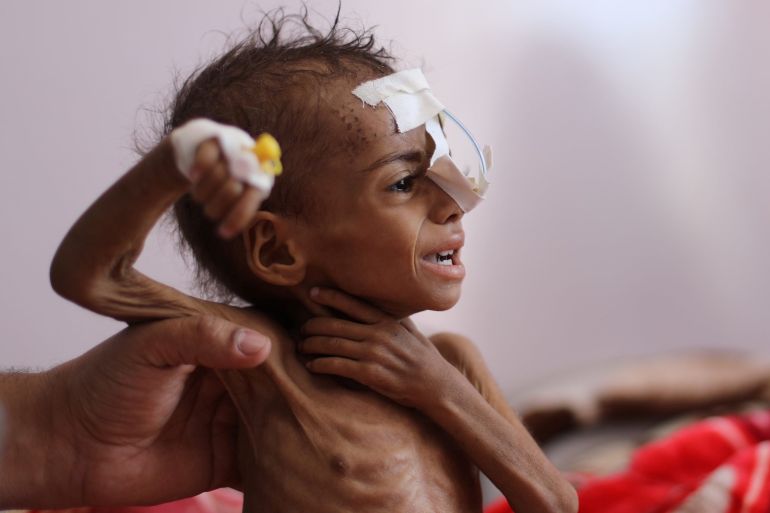We Communicate For Happy Children
 The Tragedy of Yemen: Ravaging hunger and waning funding, with children as the most affected
The Tragedy of Yemen: Ravaging hunger and waning funding, with children as the most affected 
More than eight years after the eruption of the war in Yemen, 24.1 million people are still at risk of famine and diseases, according to United Nations estimates, including around 11 million children, according to UNICEF.
While thousands of children have been killed, maimed, recruited, and subjected to exploitation and violence throughout the years of the war, the livelihoods, economic, social, health, and psychological situation is deteriorating by the day. The World Bank described it as one of the world’s largest humanitarian crises. Year after year, the funding allocated for humanitarian aid in Yemen is dwindling. As crises and wars disproportionately affect vulnerable groups, particularly children, Save the Children called for urgent action and prioritization of the needs of the most vulnerable children in Yemen. This call came after the failure of the donor conference, organized by the United Nations in Geneva on February 27, 2023, to raise more than 28% of the required funding to support the 2023 Humanitarian Response Plan, which amounts to USD1.2 billion out of USD4.3 billion, per the United Nations.
In the same context, the United Nations High Commissioer for Refugees (UNHCR) called for greater efforts and more resources to meet the urgent and growing humanitarian needs in Yemen. The UNHCR explained that this support enables humanitarian workers to reach the most vulnerable families and provide them with necessary assistance and services, such as legal and psychological support or programs specifically aimed at protecting children and other frail individuals in the community.
While over two-thirds of the Yemeni population lives below the poverty line, the UNHCR noted that 93% of displaced Yemeni families have at least one family member experiencing vulnerability, whether due to injury, psychological distress, child labor, or elderly individuals lacking care. The prolonged conflict and displacement, coupled with the lack of livelihoods and essential services like food, contribute to increased protection risks. Many children end up leaving schools and resorting to begging to support their families. Widows and unmarried women shoulder the responsibility of caring for their families, while early marriage for girls becomes a survival strategy for many.
On the nutritional and health levels, the conflict has exacerbated the ongoing crisis of severe acute malnutrition in the country. Per UNICEF estimates,this affects approximately 2.2 million children, including over 540,000 children suffering from severe acute malnutrition, which is life-threatening unless promptly addressed. Furthermore, millions of children have no access to clean water, sanitation services, nor proper hygiene. This comes as a consequence of the destruction of more than a third of water and sanitation facilities in the country since the start of the war, per the latest World Bank report on May 30, 2023. Yemen continues to suffer from consecutive outbreaks of cholera, measles, diphtheria, and other preventable diseases that could be controlled through vaccinations.
On the educational front, UNICEF indicates that the destruction and closures of schools have left over 2.57 million children without schooling, making them more susceptible to dangers and risks.
